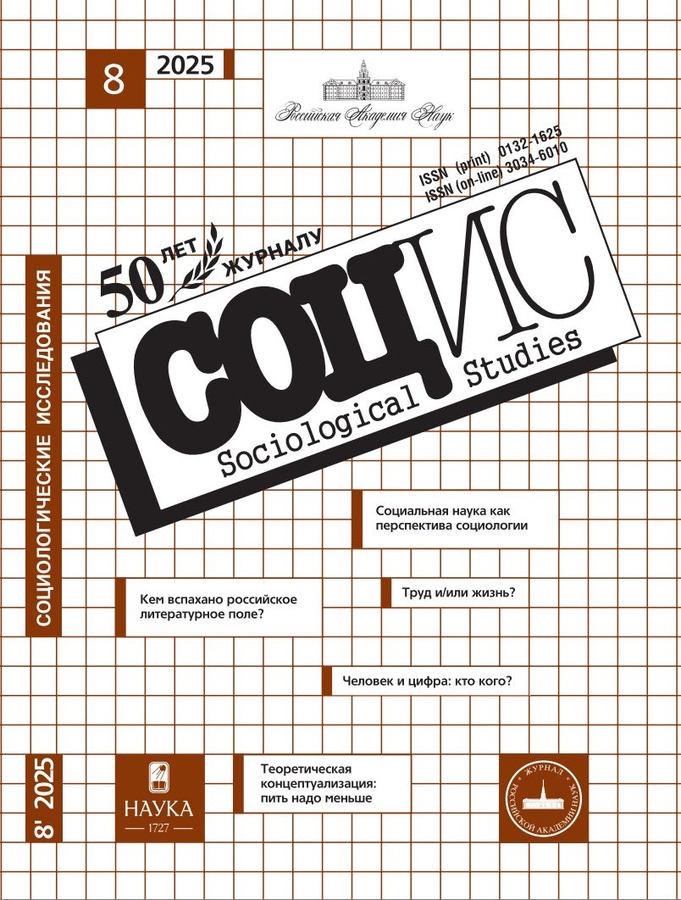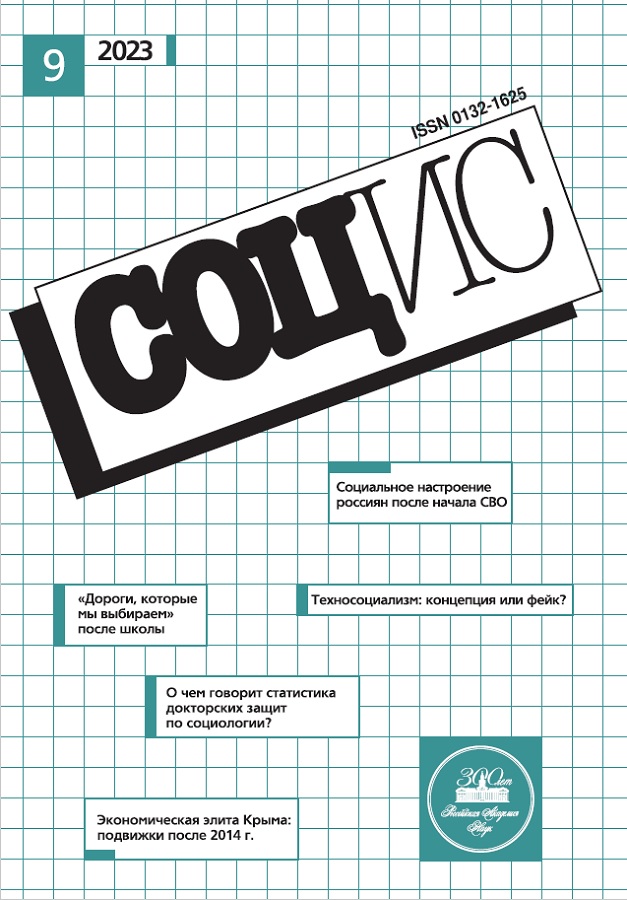Профессиональные стратегии студентов в контексте образа социального будущего
- Авторы: Дидковская Я.Д.1, Трынов Д.1, Чистяков П.А.1,2
-
Учреждения:
- Уральский федеральный университет
- Институт математики и механики УрО РАН
- Выпуск: № 9 (2023)
- Страницы: 63-77
- Раздел: Статьи
- URL: https://cijournal.ru/0132-1625/article/view/661911
- DOI: https://doi.org/10.31857/S013216250027778-8
- ID: 661911
Цитировать
Полный текст
Аннотация
Рассматривается влияние характеристик образа социального будущего студенческой молодежи на построение ею профессиональных стратегий. Образ социального будущего интерпретируется как система представлений, ценностных ориентаций и настроений молодых людей относительно перспектив развития социума и возможностей реализовать свой индивидуальный жизненный проект в нем. Выводы авторов опираются на анализ результатов последнего этапа социологического мониторинга «Студент-2020» (2020-2021 гг., квотно-гнездовая выборка; 13 вузов Екатеринбурга; N=2000). Выявлено, что динамика профессиональных ценностей екатеринбуржских студентов характеризуется некоторым усилением тренда утилитарности и прагматичности образа профессионального будущего. При помощи кластерного анализа выделено четыре типа профессиональных стратегий студентов: наиболее представленной является стратегия карьеры наемного работника, наименее – предпринимательская, распространены стратегии отложенного профессионального самоопределения и эскапизма. Показано, что социальный оптимизм в значительной степени способствует предпочтению профессиональной стратегии карьеры наемного работника и в определенной мере предпринимательской стратегии; социальный пессимизм и ожидание наступления негативных событий в будущем более всего способствует формированию стратегии эскапизма.
Об авторах
Яна Дидковская Дидковская
Уральский федеральный университетЕкатеринбург, Россия
Дмитрий Трынов
Уральский федеральный университетЕкатеринбург, Россия
Павел Александрович Чистяков
Уральский федеральный университет; Институт математики и механики УрО РАНЕкатеринбург, Россия
Список литературы
- Абульханова-Славская К.А. Стратегия жизни. М.: Мысль, 1991.
- Бочко В.С., Захарчук Е.А. Методология формирования образа будущего при разработке стратегии развития территории // Журнал экономической теории. 2019. Т. 16. № 4. С. 688–704. doi: 10.31063/2073-6517/2019.16-4.7.
- Валлерстайн И., Коллинз Р., Манн М. и др. Есть ли будущее у капитализма? М.: Ин-т Гайдара, 2015.
- Дидковская Я.В., Вишневский Ю.Р., Трынов Д.В. Студенчество индустриальных регионов России: социальное самочувствие и образ будущего (на примере Свердловской области и Пермского края) // Вестник ПНИПУ. Социально-экономические науки. 2020. № 1. С. 8–24. doi: 10.15593/2224-9354/2020.1.1.
- Зубок Ю. А., Чупров В. И. Жизненные стратегии молодежи: реализация ожиданий и социальные настроения // Мониторинг общественного мнения: экономические и социальные перемены. 2020. № 3. С. 13–41.
- Инглхарт Р.Ф., Вельцель К. Модернизация, культурные изменения и демократия. Последовательность человеческого развития. М.: Новое издательство, 2011.
- Карачаровский В.В., Шкаратан О.И. Разные цели одного общества // Социологические исследования. 2019. № 1. С. 5–17. DOI: 10.31857/ S013216250003743-0.
- Кастельс М. Власть коммуникации. М.: ВШЭ, 2016.
- Мчедлова М.М. Российская поликонфессиональность и солидарный образ будущего // Вестник ВолГУ. Сер. «Социальные и гуманитарные науки». 2019. № 4 (24). С. 66–74.
- Пикетти Т. Капитал в XXI веке. М.: Ад Маргинем, 2016.
- Резник Ю.М., Смирнов Е.А. Жизненные стратегии личности (опыт комплексного анализа. М.: Ин-т человека РАН. Независимый институт гражданского общества, 2002.
- Стэндинг Г. Прекариат: новый опасный класс. М.: Ад Маргинем, 2014.
- Шаповалова И.С., Кисиленко A.B. Духовно-нравственные выборы в жизненных стратегиях молодежи: опыт социологического исследования // Среднерусский вестник общественных наук. 2018. № 6. С. 15–28.
- Bovenberg A. L. The Life-course Perspective and Social Policies: An Overview of the Issues // Cesifo Economic Studies. 2008. Vol. 54. No. 4: 593–641. doi: 10.1093/cesifo/ifn029.
- Buhl H.M., Noack P., Kracke B. The Role of Parents and Peers in the Transition From University to Work Life // Journal of Career Development. 2018. Vol. 45. No. 6: 523–535. doi: 10.1177/0894845317720728.
- Caliskan H., Sapmaz F., Uzunkol E. Value Preferences of University Students as Predictors of Life Goals // Social Indicators Research. 2015. Vol. 124. No. 1: 111–125. doi: 10.1007/s11205-014-0778-4.
- Clausen J.A. American Lives. N.Y.: Free Press, 1993.
- Elder G.H., Jr. Perspectives on the Life Course // Elder G.H., Jr. (eds) Life Course Dynamics: trajectories and transitions, 1968–1980. Ithaca: Cornell University Press, 1985. P. 23–49.
- Evans K., Furlong A. Metaphors of Youth Transitions: Neches, Pathways, Trajectories or Navigations // Bynner J., Chisholm L., Furlong А. (eds) Youth, Citizenshipand Social Change in a European Context. Aldershot: Ashgate, 1997. P. 17–41.
- Frey C., Osborne M. The Future оf Employment: How Susceptible Are Jobs to Computerisation? // Technological Forecasting and Social Change. 2017. Vol. 114. P. 254–280/
- Kasser T. Materialistic Values and Goals // Annual Review of Psychology. 2016. Vol. 67. Р. 489–514. doi: 10.1146/annurev-psych-122414-033344.
- Korkmaz О, Önder F.C. The Relation Between Life Goals and Career Adapt-Abilities: An Investigation of the Mediating Role of Hope // Еducation and Science. 2019. Vol. 44. No. 200. Р. 59–76.
- Lendák-Kabók К. A. Gender Perspective on Language, Ethnicity, and Otherness in the Serbian Higher Education System // Journal of Language, Identity & Education. 2021. No. ? Vol. ? P. ?. doi: 10.1080/15348458.2021.1920415.
- Martos T., Kopp M.S. Life Goals and Well-Being: Does Financial Status Matter? Evidence from a Representative Hungarian Sample // Social Indicators Research. 2012. No. 105(3). Р. 561–568. doi: 10.1007/s11205-011-9788-7.
- Polak F. The Image of the Future. Amsterdam, London, New York: Elsevier Scientific Publishing Company, 1973.
- Vautero J., Silva A.D., do Céu Taveira M. Family influence on undergraduates’ career choice implementation // International Journal for Educational and Vocational Guidance. 2021. No. ? Р. 551–570. doi: 10.1007/s10775-020-09453-0.
Дополнительные файлы











